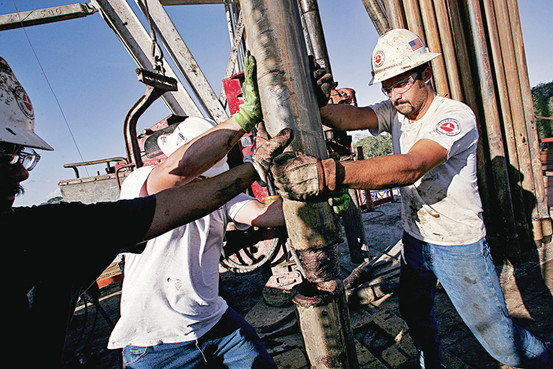 In an August 5th op-ed, the New York Times’ Thomas Friedman urges America to “Get It Right On Gas.” While noting domestic natural gas development’s potential to address a host of energy policy issues – the trade imbalance and job creation, greenhouse gas emissions, and energy security – Friedman quotes Energy Innovation’s Hal Harvey in asking if natural gas offers “a transition to a clean energy future, or does it defer a clean energy future?”
In an August 5th op-ed, the New York Times’ Thomas Friedman urges America to “Get It Right On Gas.” While noting domestic natural gas development’s potential to address a host of energy policy issues – the trade imbalance and job creation, greenhouse gas emissions, and energy security – Friedman quotes Energy Innovation’s Hal Harvey in asking if natural gas offers “a transition to a clean energy future, or does it defer a clean energy future?”
“A sustained [natural] gas glut could undermine new investments in wind, solar, nuclear and energy efficiency systems – which have zero emissions – and thus keep us addicted to fossil fuels for decades,” Friedman writes. He suggests that such a scenario would reduce natural gas’ societal value because the economic and energy security benefits of domestic natural gas come with significant environmental trade-offs, such as climate impact and hydraulic fracturing.
To maximize natural gas’ value to society, Friedman argues for “nationally accepted standards for controlling methane leakage, for controlling water used in fracking — where you get it, how you treat the polluted water that comes out from the fracking process and how you protect aquifers — and for ensuring that communities have the right to say no to drilling.” He goes on to say that a carbon tax, which would raise the price of natural gas, could raise enough revenue to help pay down the national debt, lower income and corporate taxes, and help make renewables cost-competitive with natural gas.
What’s required to ‘get it right’ with domestic natural gas development and use? Would a carbon tax increase natural gas’ value?
I wholeheartedly agree on nationally accepted standards for minimizing environmental impacts of natural gas extraction, but am not fully on board with the argument that natural gas will crowd out… Read more »
I think exporting the huge supply build up the US is experiencing is something that can happen now – if it’s already there we might as well use it. And,… Read more »
One of my firs thoughts about natural gas is that there is indeed a “boom mentality”, and a great deal of hype from most places in the world concerning the… Read more »
[…] with my views on that matter as well. The questions were posed on OEP’s post entitled “Can We Get It Right On Gas?” – click the link for the setup;… Read more »
I must take exception to Jesse’s comments on a couple of points. The first is that for all the press shale gas has gotten, it has not been over-hyped. For… Read more »
Perhaps I didn’t state it explicitly, but, in no way do I not see shale gas having a global impact on energy sources and markets. “The first is that for… Read more »
“The carbon tax is a far better piece of policy than dragging our feet regarding what may be the best thing our economy has going for it.” My position is… Read more »
Another update from New York’s decision on whether or not to allow fracking: “Dear Governor Cuomo, We—the undersigned scientists, medical professionals, elected officials, business persons, and economists – protest the… Read more »
As to the reality and long term significance of the current shale gas boom, I feel that the jury is still out. Yes, there’s a whole lot of gas-bearing shale… Read more »
Ich bin ein Berliner- Ich bin ein environmentalist and natural gas advocate Back to memory lane! How many of you remember President John Kennedy’s dramatic speech at the Berlin Wall… Read more »
A comment absolutely exemplary in it’s cogency, Marshall. It’s clear that your status as elder statesman is well deserved. Most particularly your noting our society’s repeatedly allowing the ideal to… Read more »
“This summer’s extreme drought in the Midwest has since added to water concerns, a technical issue that can be overcome.” A technical issue that can be overcome? I wonder how… Read more »
thank you joel . I really do believe that if we got people on both sides of the issue re. natural gas and the environment in one room and maybe… Read more »
How do you actually proposed to indict the bad companies – by what manner of regulation or enforcement? “We should focus our efforts on insuring that it is done correctly… Read more »
You should also check the Michigan Dept. of Environmental Quality (DEQ). The Antrim Shale development in the northern part of the main body of the state has been ongoing for… Read more »
As to your question re indictment, a sliding scale of punishment for serious infractions up to an including a permanent trip to the penalty box would be a good start.… Read more »